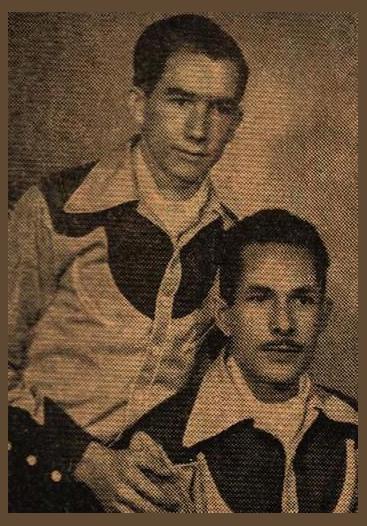 Zé Tapera e Chiquinho
Zé Tapera e Chiquinho
Zé Tapera e Chiquinho: A Musical Journey of Two Brazilian Troubadours
In the annals of Brazilian folk music, the duo Zé Tapera and Chiquinho stands as a testament to the transformative power of storytelling through song. Their iconic composition, "A Viola e o Cantador," became an anthem for the underprivileged, echoing the struggles and aspirations of the marginalized.
Early Years and Challenges
José Teodoro de Sousa, known as Zé Tapera, was born in 1929 in the impoverished countryside of Ceará, Brazil. Raised in a humble family, he developed a passion for music at a young age. As a young man, he honed his skills as a viola player and vocalist, performing in local gatherings and fairs.
In 1952, Tapera met Francisco Ribeiro, a gifted guitarist known as Chiquinho. Sharing a love for traditional Brazilian music, they formed a duo that would soon captivate audiences across the country. However, their path was not without challenges. In the early days of their career, they struggled for recognition and faced discrimination due to their humble origins.
Rise to Prominence
Undeterred, Zé Tapera and Chiquinho persevered, honing their craft and drawing inspiration from the lives of the common people. Their songs, often imbued with social commentary, resonated with a growing audience eager for a voice that spoke to their experiences.
In 1964, their breakthrough came with the release of "A Viola e o Cantador." The poignant lyrics, accompanied by Tapera's haunting viola melodies and Chiquinho's intricate guitar work, struck a chord with the nation. The song became an instant hit, establishing the duo as icons of Brazilian folk music.
Controversy and Legacy
Throughout their career, Zé Tapera and Chiquinho navigated controversies surrounding their political views and the lyrical content of their songs. Their outspoken support for leftist movements and their portrayal of social injustice drew criticism from some quarters.
Despite the challenges, the legacy of Zé Tapera and Chiquinho remains unassailable. Their music has inspired generations of Brazilian artists and continues to resonate with audiences worldwide. Their ability to give voice to the voiceless and to bridge social divides through the power of song has cemented their place in history as true troubadours of the Brazilian people.
Discography
* A Viola e o Cantador (1964)
* Viola de Comer (1965)
* Viola do Povo (1966)
* Cantares do Nordeste (1967)
* Viola de Lutas (1968)
Members
* José Teodoro de Sousa (Zé Tapera): Vocals, viola
* Francisco Ribeiro (Chiquinho): Guitar, vocals
In the annals of Brazilian folk music, the duo Zé Tapera and Chiquinho stands as a testament to the transformative power of storytelling through song. Their iconic composition, "A Viola e o Cantador," became an anthem for the underprivileged, echoing the struggles and aspirations of the marginalized.
Early Years and Challenges
José Teodoro de Sousa, known as Zé Tapera, was born in 1929 in the impoverished countryside of Ceará, Brazil. Raised in a humble family, he developed a passion for music at a young age. As a young man, he honed his skills as a viola player and vocalist, performing in local gatherings and fairs.
In 1952, Tapera met Francisco Ribeiro, a gifted guitarist known as Chiquinho. Sharing a love for traditional Brazilian music, they formed a duo that would soon captivate audiences across the country. However, their path was not without challenges. In the early days of their career, they struggled for recognition and faced discrimination due to their humble origins.
Rise to Prominence
Undeterred, Zé Tapera and Chiquinho persevered, honing their craft and drawing inspiration from the lives of the common people. Their songs, often imbued with social commentary, resonated with a growing audience eager for a voice that spoke to their experiences.
In 1964, their breakthrough came with the release of "A Viola e o Cantador." The poignant lyrics, accompanied by Tapera's haunting viola melodies and Chiquinho's intricate guitar work, struck a chord with the nation. The song became an instant hit, establishing the duo as icons of Brazilian folk music.
Controversy and Legacy
Throughout their career, Zé Tapera and Chiquinho navigated controversies surrounding their political views and the lyrical content of their songs. Their outspoken support for leftist movements and their portrayal of social injustice drew criticism from some quarters.
Despite the challenges, the legacy of Zé Tapera and Chiquinho remains unassailable. Their music has inspired generations of Brazilian artists and continues to resonate with audiences worldwide. Their ability to give voice to the voiceless and to bridge social divides through the power of song has cemented their place in history as true troubadours of the Brazilian people.
Discography
* A Viola e o Cantador (1964)
* Viola de Comer (1965)
* Viola do Povo (1966)
* Cantares do Nordeste (1967)
* Viola de Lutas (1968)
Members
* José Teodoro de Sousa (Zé Tapera): Vocals, viola
* Francisco Ribeiro (Chiquinho): Guitar, vocals